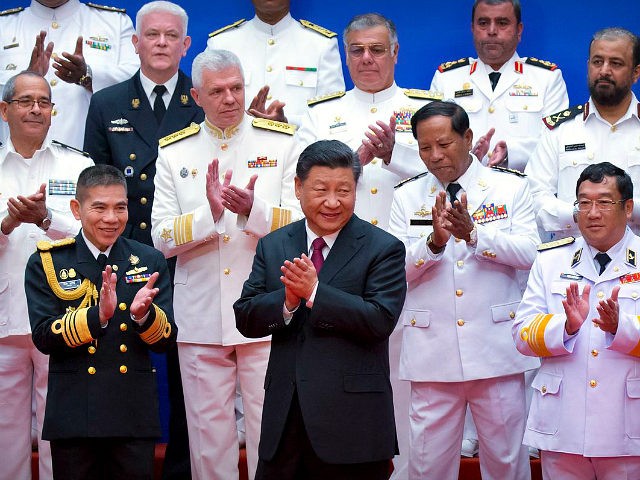China’s Communist Party leader Xi Jinping, who also serves as central military commission chairman, kicked off a large-scale parade on Tuesday to mark the 70th anniversary of the founding of the People Liberation Army’s (PLA) naval branch.
The parade came amid tensions with the United States over Beijing’s territorial claims in the South China Sea, intellectual property theft, ongoing trade war, and China’s ambitious Belt and Road Initiative (BRI) considered a threat by Washington, among other issues.
Early this year, Adm. Philip Davidson, the top American commander in the Indo-Pacific region, warned lawmakers that China’s “massive” effort to modernize the PLA is “eroding” the United States’ “relative competitive military advantage,” further stressing that Beijing’s communist leaders are sensing “weaknesses” on the U.S. side.
Nevertheless, when meeting foreign delegations at the parade’s inauguration in the eastern Chinese city of Qingdao, Xi urged the navies of the world to work together to protect maritime peace and order, Reuters reports, citing comments exclusively carried by the state-owned Xinhua news agency after Chinese authorities ordered foreign reporters to leave.
The increasingly authoritarian Xi declared:
The Chinese people love and long for peace, and will unswervingly follow the path of peaceful development. … Everyone should respect each other, treat each other as equals, enhance mutual trust, strengthen maritime dialogue and exchanges, and deepen [the] pragmatic cooperation between navies.
There must be more discussions and consultations between countries, and there cannot be resorts to force or threats of force at the slightest pretext.
All countries should adhere to equal consultations, improve crisis communication mechanisms, strengthen regional security cooperation, and promote the proper settlement of maritime-related disputes.
His comments came as China continues to militarize artificial islands it built in the South China Sea and claim ownership of land in the region, a move disputed by Vietnam, the Philippines, Taiwan, Malaysia, and Brunei.
Echoing Adm. Davidson, Reuters reports:
Xi is overseeing a sweeping plan to refurbish the People’s Liberation Army (PLA) by developing everything from stealth jets to aircraft carriers as China ramps up its presence in the disputed South China Sea and around self-ruled Taiwan, which has rattled nerves around the region and in Washington.
The navy has been a major beneficiary of the modernization, with China looking to project power far from its shores and protect its trading routes and citizens overseas.
The U.S. has warned China against its activities in the South China Sea and beyond, most recently in America’s backyard Venezuela.
Moreover, the U.S. has also called on Beijing to stop its mistreatment of the country’s Muslim and Christian minorities. China has repeatedly denied that hundreds of thousands of predominantly Uighur Muslims and Christians of all ethnicities are facing systemic torture, disappearances, executions, and arbitrary detentions. China has reportedly targeted Muslims in particular for imprisonment in re-education or mind-transformation camps aimed at erasing their religious identity in favor of the inherently atheist Communist Party.
U.S. Secretary of State Mike Pompeo recently said Beijing is prolonging the dire humanitarian crisis in Venezuela by financially supporting dictator Nicolás Maduro. Trump and members of his administration, joined by about 50 countries, have recognized Juan Guaidó as the interim president of the South American country and have vowed to help the Venezuelan people transition away from Maduro.
When unveiling Trump’s Africa strategy late last year, U.S. National Security Advisor John Bolton accused Russia and China of “predatory practices” that interfere with American military operations on the continent and pose a significant threat to America’s homeland security interests.
Under Trump, the U.S. military is prioritizing the threat posed by strategic competitors China and Russia over the war on terror. China has surfaced as America’s top competitor in Africa.
China’s naval parade is expected to feature 32 Chinese warships and 39 aircraft, as well as war vessels from 13 foreign countries including India, Japan, Vietnam, and Australia. “A total of 61 countries have sent delegations to the event, which includes a naval symposium on Wednesday and Thursday,” Reuters points out.
“China has said it will display for the first time new nuclear submarines and warships,” it adds. “China has frequently had to rebuff concerns about its military intentions, especially as military spending continues to scale new heights.”
Claiming it has nothing to hide, China invited a small group of foreign media representatives to watch the parade from a naval ship.
Xi issued the order to commence the naval parade as he showed off the first of China’s new generation of guided missile destroyer Xining.
“Salute to you, comrades. Comrades, thanks for your hard work,” Xi called out to the officers who reportedly stood in a ceremonial formation, saluting as they sailed by, according to state television.
“Hail to you, chairman,” they replied. “Serve the people.”
The parade is reportedly part of four-days of international naval events that are expected to feature “high-level seminars and cultural and sports exchanges,” Xinhua notes.

COMMENTS
Please let us know if you're having issues with commenting.